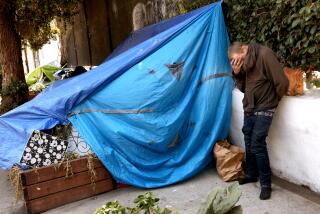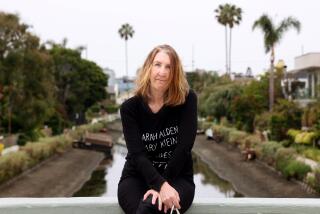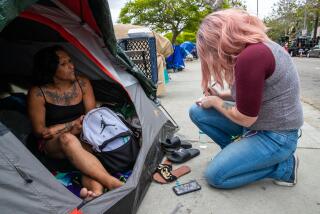A Venice couple is housing homeless people, one small building at a time
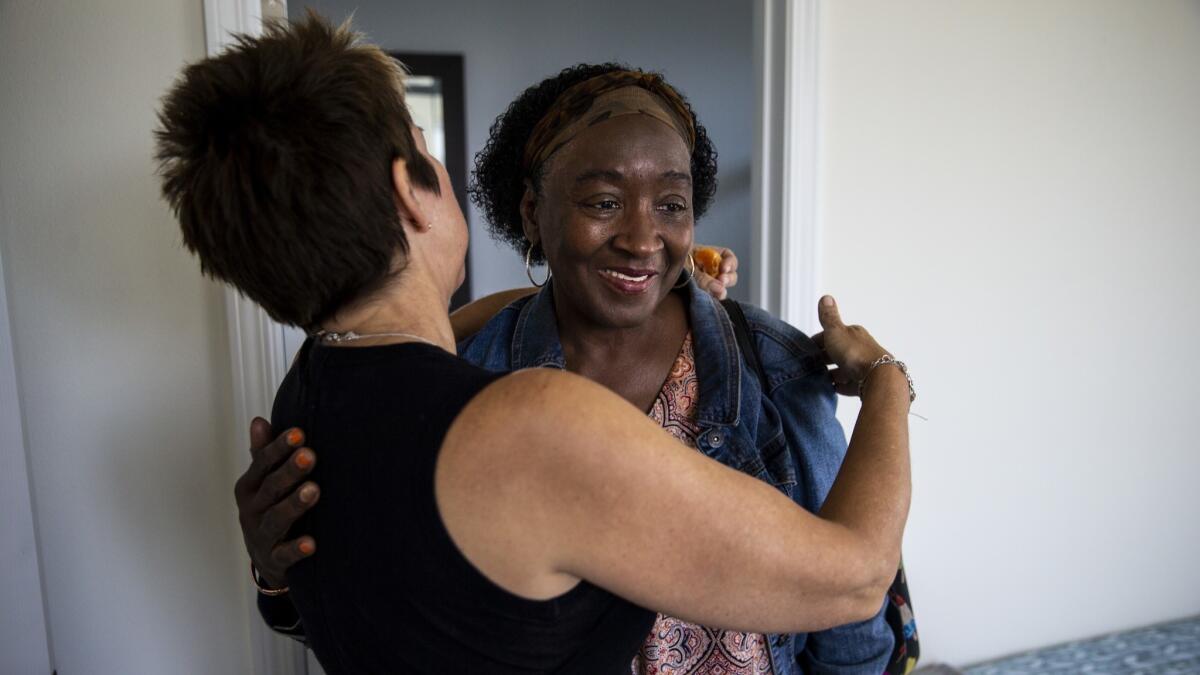
- Share via
Ouedia came by bus from Westlake. A friend brought Crickett from Venice Beach. Patricia and Linda drove in the cars they’d been sleeping in. Mona was dropped off by her daughter.
By the end of the day, the homeless women had met their new roommates, signed their rental agreements, washed and closeted their clothes and fought back tears reading the welcome notes waiting for them on their new beds.
Along with its emotional pull, the day marked a hopeful step into the unknown for a Venice couple who are trying to show what individuals can do, with only marginal help from the government, to house the homeless.
The 20 women and eight men now living in the newly constructed apartment building in South Los Angeles are all paying their own rent. Aside from Social Security, the primary income for most of them, they receive no subsidies.
Their landlords, Heidi Roberts and John Betz, were at the building that day to hand out keys and work out payment schedules. Roberts and Betz are mom-and-pop investors who own apartments on the Westside and in Long Beach. They have also long been active with homeless services groups.
Last year, they brought the two pursuits together after buying a property near Manchester Boulevard and Main Street from a builder who was leveling an abandoned house to make room for a small apartment building.
“Ten years ago, John and I were jumping up and down saying, ‘Housing, housing, housing,’ and they just never seem to get housing done,” Roberts said. ”So that’s why John and I said, ‘Screw it. Here’s housing.’”
Roberts, an advertising strategist, said she and Betz, a pilot in the Port of Los Angeles, aim to house 108 homeless people by the end of the year, a goal tied to her personal lucky number, but also what they think is doable.
They are now in escrow on two more buildings.
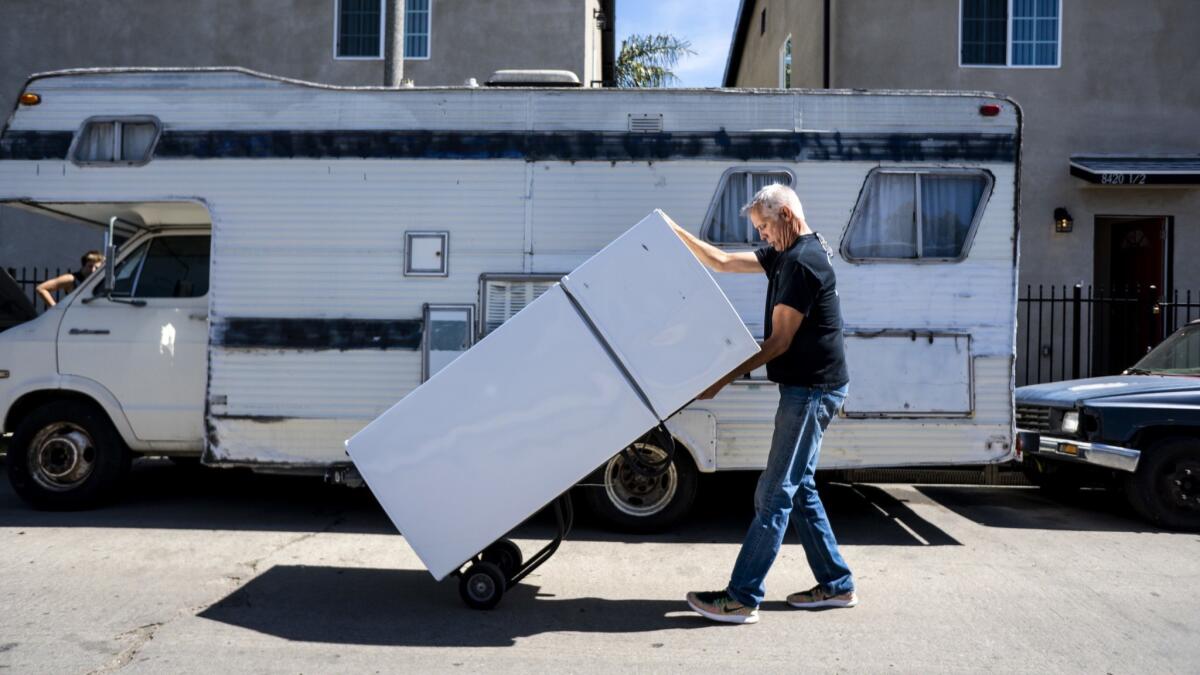
Their plan to lease the four-unit building exclusively to homeless people may be daring, but it isn’t meant as charity. Betz said he expects to turn a profit, though possibly a more modest one than the couple’s other investments have.
The key to their financial plan rests with a Culver City nonprofit called SHARE, which stands for Self-Help and Recovery Exchange. The organization places extremely low-income people into market-rate housing by matching renters two to a bedroom.
The group has about 400 tenants in 51 locations in the Los Angeles area, mostly single-family houses.
The practice of rooming strangers together is not just a means to economize, said Jason Robison, the group’s program director. It’s a homeless model distinct from the growing trend of what is generally called shared housing — placing several people in a multi-bedroom apartment one to a room.
READ MORE: Many people work hard to avoid the homeless. These volunteers embrace them »
Robison sees shared living as an alternative to the mainstream model that, in his words, dictates “every person deserves their own space — 350 to 400 square feet and that’s theirs.”
For those with the kind of disability that self-help groups are meant for, isolation is part of the problem, Robison said.
“They go into that bedroom, they lock the door and they don’t come out,” he said. “When they share a bedroom, they use the whole house and they develop the relationships that support them.”
Emphasizing community over clinical treatment, SHARE asks its tenants to attend two self-help groups each week and supports them with what it calls peer-bridgers, case managers who are in recovery themselves.
That maverick outlook attracted Roberts, who said she was growing jaded after working for years with mainstream homeless service providers to get homeless people off Venice’s streets.
Roberts said she learned of the organization about four years ago while volunteering one day a week at the front desk of PATH, or People Assisting the Homeless, an East Hollywood agency.
“People would walk in and I would try to find them someplace to go,” she recalled. “No surprise, there was nowhere for them to go — just the missions down on skid row.”
One day someone dropped off a SHARE flier offering same-day housing. She made a couple of referrals and was surprised that they worked out.
The group has also been endorsed by L.A. City Councilman Mike Bonin, who put up $50,000 of his office funds for a pilot program to find housing for 15 people in his Westside district.
Bonin, who views SHARE’s model as one of many approaches needed to address homelessness, praised Roberts and Betz for adopting it in their business plan.
“I love that it is from the neighborhood up,” he said. “It’s people independently getting involved in a solution.”
Last week Bonin introduced a motion calling for a report on how the city could fund an expansion of the program.
For the couple, the decision to team with SHARE opened an intimate connection to what would have been just a building. They named it Weller House after their local heroes, the late Rev. Steven Weller and his wife, Regina, who ministered to Venice’s homeless.
They memorialized the Wellers with inscriptions written inside the walls.
As move-in day approached in April, Roberts made trips to Ikea for the essentials, and Betz drove a U-Haul to pick up refrigerators, washers and assorted chairs donated by friends. Donated pictures were hung on every wall.
Friends joined them to make up 28 beds and write a welcome card for each.
“Dear Weller House resident, welcome to your new home,” read the card Patricia Wilson picked up off her new pillow. “We wish you love, peace and joy in your new home. Peace.”
Wilson broke into tears.
“They didn’t have to do this,” she said. “They didn’t have to go out of their way to do this for us.”
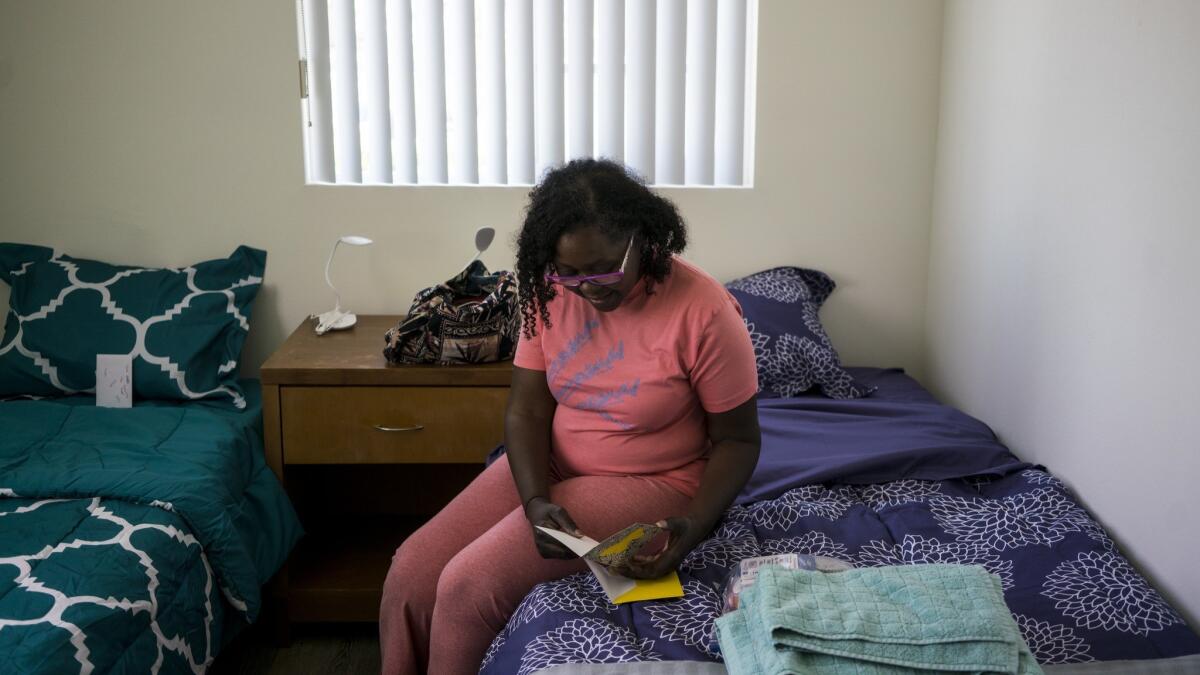
By the end of opening day, 18 of the beds were taken. SHARE had sent seven new tenants straight off the street, eight from shelters and three from other SHARE homes, Robison said.
Several of the women had only recently become homeless. Ouedia Coln said she was evicted in March by the new owners of a hotel where she had lived 11 years when she couldn’t document her Social Security income to their satisfaction.
She said she lived in motels until her money ran out, then spent one miserable night walking the streets of downtown.
Crickett Sales lived two weeks on Venice Beach after her daughter in Connecticut kicked her out.
At the end of the day, Roberts, who wasn’t involved in selecting the tenants, had expected them to look more down and out.
“To be honest, they’re just like me,” she said. “They’re just women who have had some financial struggles.”
After the first impressions had passed, a more complicated picture emerged. In the days that followed, peer bridger Rachel Estrada assessed the new tenants for physical or mental disabilities. Eight of the 20 women scored as highly vulnerable.
Estrada, who has 122 clients in nine houses, said she would be by at least twice a week to work on the tenants’ “plans for success” and participation in self-help groups, both staples of SHARE’s program.
One afternoon, several of the women sat with Estrada on a sunny porch speaking almost giddily of their good fortune. So far they had only one suggestion for Roberts and Betz: individual closets.
“If you build another one, you ought to keep in mind we’re females and we need closets,” Sales said. “I have dresses, very frilly stuff.”
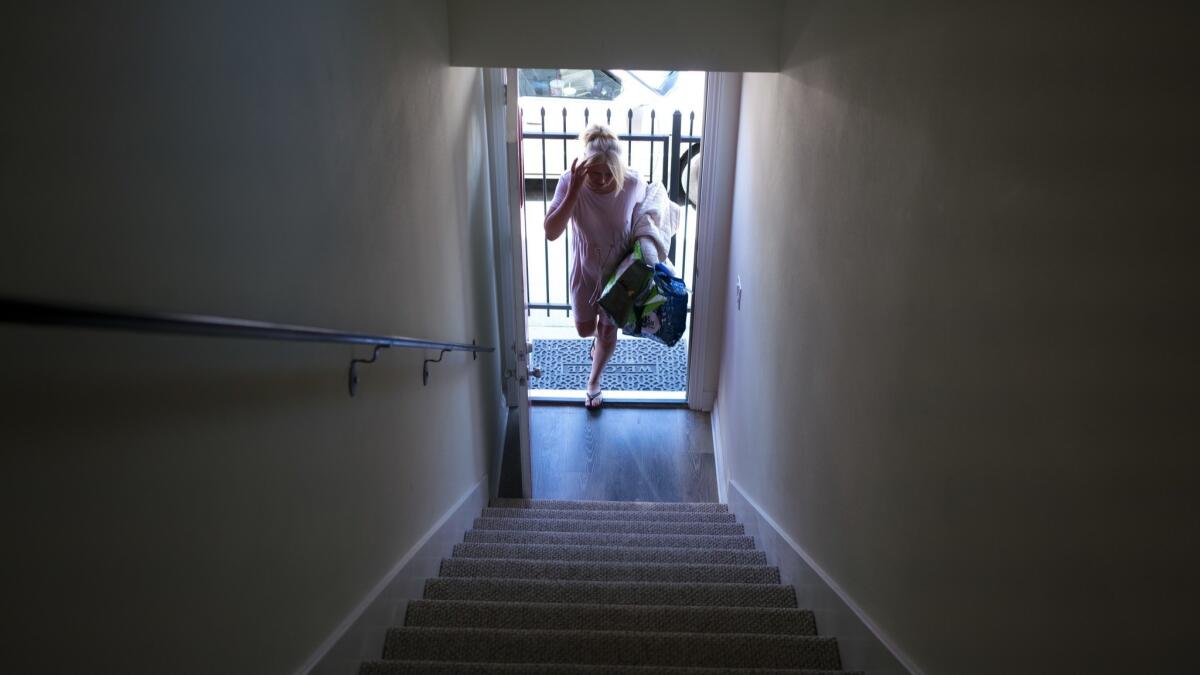
Twitter: @LATDoug
More to Read
Sign up for Essential California
The most important California stories and recommendations in your inbox every morning.
You may occasionally receive promotional content from the Los Angeles Times.
